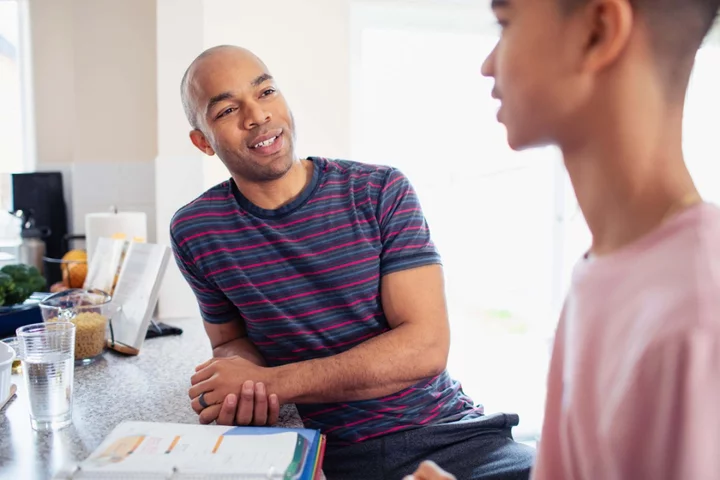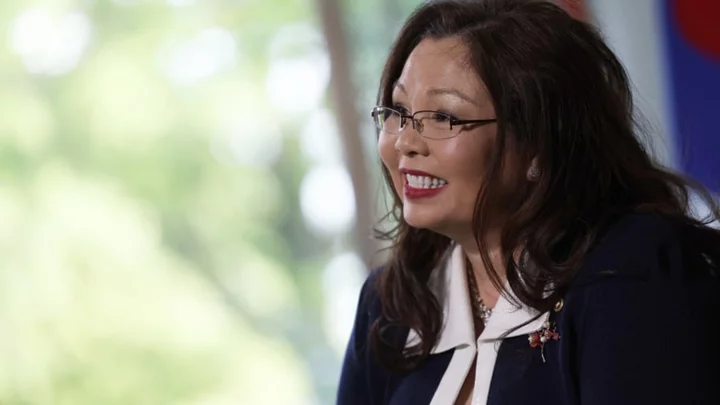
9 actually useful things you can do to support teens this exam season
Exam season is underway, and many teenagers might be feeling overwhelmed about the important tests they’re facing over the next few months. “Sitting exams is often one of the most overwhelming and high pressure experiences teens face, and students often put immense pressure on themselves,” says Lara McIvor, a revision expert at Save My Exams. “For parents with children taking exams, it can be difficult to know how best to support their child without being too involved or under-supportive. “As parents and teachers, it should be our mission to ensure students have access to clear support systems, coping mechanisms and study techniques over these challenging few months, and we should all be better educated in the warning signs of stress in teens.” And Matt Buttery, CEO of the Triple P Positive Parenting Programme, adds: “This can be a stressful time, but the good news is that parents can support young people and help remove some of the pressure around exam season. By setting a positive example and encouraging them, you can help ensure they remain happy and healthy, as well as reach their full academic potential.” So what can parents and carers do to actually make the whole exam experience better for teens? 1. Encourage them to chat with you Encourage open communication, and if your teen seems stressed, ask if they’d like to talk through revision together, or more broadly discuss their concerns, suggests Buttery. “It’s important your child knows you’re there for them if they need you,” he stresses. 2. Set up a quiet study area Ensuring your child has an optimum place to study without distractions is vital to their success, McIvor says. “Often concentration can wane, so making sure there are limited external distractions – such as loud music or TV – will allow for the best results and prepare them for their silent exams,” she says. 3. Don’t just rush to make them feel better It’s vital to acknowledge what teenagers are feeling, rather than just trying to make it go away, stresses psychologist Dr Audrey Tang. “One of the most important things anyone can do is validate their right to feel as they do,” she explains. “We’re not very good at sitting with anxiety and often rush to try and make it go away or to feel better, and this can lead us to quick fixes which can include unhealthy behaviour choices such as not bothering to try, often led by unhealthy thoughts like ‘If I don’t try, I can’t fail’.” 4. Help teenagers unpack their feelings Encourage teens to analyse or unpack how they’re feeling about their exams and revision, advises Tang. “If we take a moment to respect our feelings, and try to unpack exactly what we’re worrying about, we may be able to work out what we need to do next,” she explains. For example, is your teen’s anxiety caused by them not understanding some things, and if it is, which specific bits are causing the problem? Or is it linked to knowing their parents are stressed and not wanting to add to it, and if that’s the case, are other services available? “When we begin to unpack our feelings, rather than suppress or deny them, we have a better idea of what action is going to help us the most,” Tang explains. 5. Help with visual prompts Creating an ongoing learning environment throughout the exam period is key, says McIvor. She suggests sticking notes with key quotes, equations, etc on them around the house in places where your child can always see them. “This can be really useful for some students as it allows for constant exposure to materials,” she explains. 6. Avoid ‘toxic positivity’ If a teenager says things like, ‘I’m so stupid’, or ‘I’m rubbish at everything’, it’s natural for parents to tell them they’re brilliant, observes Tang. “Unfortunately, this has the effect of not validating those emotions, and the opportunity to understand what they’re trying to say is lost,” she explains. “A better way to navigate that discussion would be to acknowledge the feeling with something like ‘I’m really sorry you’re feeling that way’, and asking for more information.” 7. Be a good role model Role modelling healthy ways to manage your own anxiety is hugely important, stresses Tang. “Why would you expect a young adult to listen to you if you aren’t showing in your own practice that what you’re suggesting works?” she asks. And Buttery advises parents to lead by example by staying positive and calm when talking about exams. “Avoid using phrases such as, ‘You must be nervous’,” he says, “As you may risk accidentally making an otherwise calm child more stressed. Children learn a great deal about how to manage their behaviour and deal with difficult situations from their parents. By demonstrating calm and resilient behaviour, parents can have a positive influence on their children’s ability to cope with adversity.” 8. Try stressbusting techniques together Tang suggests practising self-care or stressbusting techniques together, such as affirmations with deep breathing. One technique, she says, is to get your child to note down everything they need to do and its relative importance on a pie chart, where the size of the slice shows the importance of the activity. Then ask them to draw on a scale of zero in the centre, to 10 on the outside, where they are in each segment. “This gives them a visual representation of what they need to do, and where they are, as well as an indication of the areas they’re neglecting, and how important those areas are,” she says. “By having everything on one pie chart, it might feel a lot more manageable.” 9. Maintain the family routine Ensuring family dinners and other rituals remain part of daily life can help teenagers cope with exam stress, as routine is predictable and reassuring at a time of pressure and uncertainty. Maintaining structure can also help your child plan their downtime, stresses Buttery, who adds: “It’s important to ensure they’re taking time to relax and unwind, whether by watching their favourite TV show, playing a game, or hanging out with friends.” Read More Charity boss speaks out over ‘traumatic’ encounter with royal aide Ukraine war’s heaviest fight rages in east - follow live Children In Need removes Pudsey’s bandana to show not all challenges are visible Is your child too anxious to go to school? What’s the link between the menopause and anxiety?
2023-05-15 22:15

17 Things You Might Not Know About Tammy Duckworth
From serving in the Iraq War to becoming the first U.S. senator to give birth in office, Tammy Duckworth has an impressive history of overcoming adversity with grit and humor.
2023-05-15 21:57

How to Remove Stubborn Ketchup and Mustard Stains
Use these tips to remove stubborn ketchup and mustard stains from your clothing.
2023-05-15 21:25

7 Dangerous and Deadly Toys From History
The toys on this list include "what were they thinking?" oddities—like a children's laboratory kit that included uranium—but also some seemingly innocuous recreational offerings.
2023-05-15 20:21

Mads Mikkelsen realises a dream with Indiana Jones role
Mads Mikkelsen has fulfilled a childhood dream with his role as villain Jurgen Voller in 'Indiana Jones and the Dial of Destiny'.
2023-05-15 19:55

Alice Braga is eager to star in I Am Legend sequel
Alice Braga would not hesitate to join the cast of the sequel to 'I Am Legend'.
2023-05-15 19:55

How to check if you have skin cancer: Symptoms and signs to look out for
It is the most common form of cancer in Britain and kills around 2,100 people in the UK each year, but still a “shocking” number of people remain unaware of the dangers of skin cancer, its links to sunburn, and how to spot the signs of this deadly disease. An overwhelming 77 per cent of people would not recognise signs of a melanoma – a malignant skin cancer tumour – despite the majority of Britons worrying about skin cancer, a new study by the British Association of Dermatologists (BAD) has found. There are two types of skin cancer; melanoma, the deadliest form of which around 13,000 new cases are diagnosed each year in the UK, and non-melanoma, of which there are more than 100,000 new cases diagnosed every year. The risk of melanoma is doubled if a person has had five or more sunburns at any age, the Skin Care Foundation states, but adds that experiencing just one blistering sunburn in childhood or adolescence more than doubles a person’s chances of developing a melanoma later in life. Non-melanoma comes in two most common forms: basal cell carcinoma, which accounts for about 75 per cent of skin cancers, and squamous cell carcinoma, which accounts for about 20 per cent. It is mainly caused by overexposure to UV light. But despite the serious risks of cancer posed from sunburn, nearly three quarters of people surveyed by BAD admitted to having been burned in the past year alone, while 40 per cent of people were found to never check themselves for signs of cancer. Here is how to check for possible signs of melanoma and non-melanoma skin cancer: Melanoma: The NHS states the first signs of a melanoma is often a new mole, or the change in appearance of an existing mole. Moles are usually round or oval, with a smooth edge, which is not bigger than 6mm in diameter. Any change in size, shape, or colour, any bleeding, crustiness or itchiness, or how painful a mole is should be shown to a doctor. The NHS has an ABCDE checklist to help people tell the difference between a normal mole and a melanoma: Asymmetrical – melanomas have two very different halves and are an irregular shape. Border – melanomas have a notched or ragged border. Colours – melanomas will be a mix of two or more colours. Diameter – melanomas are larger than 6mm (1/4 inch) in diameter. Enlargement or elevation – a mole that changes size over time is more likely to be a melanoma. Non-melanoma: Non-melanoma usually appears as a lump or discoloured patch of skin that does not heal. If a person experiences on of these patches that do not heal after four weeks, they should see their GP. Signs of Basal cell carcinoma can look like a small red or pink lump, though it can also appear as a pearly-white or waxy-looking lump, or it can also appear as a red or scaly patch of skin. The lump, whether pink or white, will grow slowly and can become crusty or bleed, or become a painless ulcer. Signs of Squamous cell carcinoma are the appearance of a firm pink lump. This lump could have a flat, scaly or crusted surface, often bleeds easily and feels tender to touch and can also become a painless ulcer. Read More UK skin cancer statistics 'shocking' Skin cancer referrals up 41 per cent in 5 years Wolverine star Hugh Jackman treated for skin cancer Cheap holidays blamed for huge rise in skin cancers
2023-05-15 19:16

Dua Lipa and Little Mix songwriter Kamille teams up with Nile Rodgers on new song
Kamille admitted it's "such an honour" to have the Chic legend featured on her original song.
2023-05-15 19:15

'The Man With My Husband's Face' on Lifetime: Release date and how to watch thriller
'The Man With My Husband's Face' is about a woman who believes her husband is missing, until she sees a man who looks just like him
2023-05-15 18:23

The Weeknd is no more. The Canadian singer has reverted to his birth name on social media
The Weeknd is now officially known online by his real name -- Abel Makkonen Tesfaye -- after following through on plans to update his social media accounts.
2023-05-15 18:17

Funds Sold as ‘Sustainable’ Hit by Crossborder Reality Check
Hardly any sustainable funds would consistently be able to market themselves as such in the UK, the US
2023-05-15 17:52

Children In Need removes Pudsey’s bandana to show not all challenges are visible
BBC Children In Need has launched a new Behind The Bandana campaign to mark Mental Health Awareness Week. The charity has temporarily removed mascot Pudsey’s eye covering to show “not all of the challenges that children and young people may be facing are visible”, the broadcaster said. The campaign encourages conversations between children and parents, carers and other trusted adults “to ensure no child faces their emotional and mental health challenges alone”. Former Love Island contestant Dr Alex George, who has campaigned for better mental health after the death of his 19-year-old brother Llyr by suicide in 2020, has been named Behind The Bandana ambassador. He said: “I know how important early intervention is in helping make a difference to the emotional wellbeing of children and young people and so I am very proud to be the ambassador of such a powerful campaign that really shines a light on the mental health crisis we are facing. “As highlighted by Pudsey bear himself, mental health issues can be less visible on the outside, but conversations and positive relationships really can help.” What’s also clear is that we can all play a role in addressing early signs of worry and anxiety by showing children and young people that we’re here to listen and to support them Simon Antrobus, Children In Need As part of the campaign, Children In Need has released the findings of a new Censuswide survey shedding light on how comfortable children feel when asking for help with their feelings and how often they feel the need to put on their “metaphorical bandana” and hide their emotions. While nine in 10 parents surveyed said they talk to their child about their mental health at least once a month, more than a quarter of young people surveyed said they had not talked to someone they trust about their mental health in the last six months. Children In Need’s boss Simon Antrobus said: “This research is a clear indication that our Behind The Bandana campaign is urgently needed. “What’s also clear is that we can all play a role in addressing early signs of worry and anxiety by showing children and young people that we’re here to listen and to support them. “By recognising and acknowledging that some feelings of worry and anxiety can be hidden means early conversations, sensitively delivered with kindness and empathy, can make a real difference to a child’s wellbeing and can help prevent mental health problems from becoming embedded.” Read More Charity boss speaks out over ‘traumatic’ encounter with royal aide Ukraine war’s heaviest fight rages in east - follow live
2023-05-15 17:21
